Changing US Attitudes on Trade
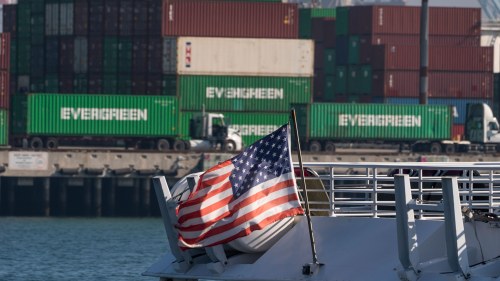
Both foreign policy leaders and the American public back “friendshoring."
In the wake of the pandemic and rising geostrategic tensions, globalization is experiencing a seismic shift. While deteriorating US-China relations led to early discussions of decoupling the two economies, the limited feasibility of that undertaking has led to an evolution in the conversation. As National Security Advisor Jake Sullivan described it in recent speech, the goal is “derisking” through supply chain diversification not decoupling. Through the CHIPS Act, the Inflation Reduction Act, and other measures, the Biden administration has embarked on an ambitious strategy of onshoring and “friendshoring” of supply chains across a range of products.
In this context, it’s worth asking whether this turn has support either among foreign policy leaders or the mass public. The short answer, from two recent surveys carried out by the Chicago Council on Global Affairs, is yes. Both the public and foreign policy experts now increasingly support sourcing goods and supply chains from friendly countries, even if it results in higher prices. By promoting “friendshoring,” the Biden administration has an opportunity to place the US trade agenda on a more sustainable political footing, while preserving the broad benefits of global economic integration.
However, our surveys also demonstrate that leaders may not understand the public’s preferences on trade policy: leaders underestimate both public esteem for trade and public backing for “friendshoring” policies.
Public Has Long Viewed Globalization as Mostly Good for the United States
As prior Chicago Council Surveys have demonstrated, Americans have for decades viewed globalization as mostly good for the United States. Since the Council first asked the question in 1998, a majority of Americans have consistently responded that globalization is mostly good for the United States. In 2021, that view reached a new high of 68 percent.
However, for the American public, China has long been a source of public ambivalence on trade. Since China’s accession to the World Trade Organization in 2001, China has become one of the most important trading partners for the United States. Americans rely on a variety of Chinese imported products, ranging from cell phones and computers to pharmaceuticals and medical products. Yet Americans have also consistently viewed China as an unfair trading partner, and in recent years have come to view trade with China as weakening US national security.
During the Trump administration, the United States initiated a trade war with China by imposing unilateral tariffs on a range of Chinese products despite concerns among many that it would hurt the US economy. Over the course of the Trump administration, the American public’s esteem for international trade increased, rising from 59 percent in 2016 to 74 percent in 2020. In part, this rise reflects growing support for international trade among Republicans, who may have seen the administration’s policies as making trade more beneficial to the United States.
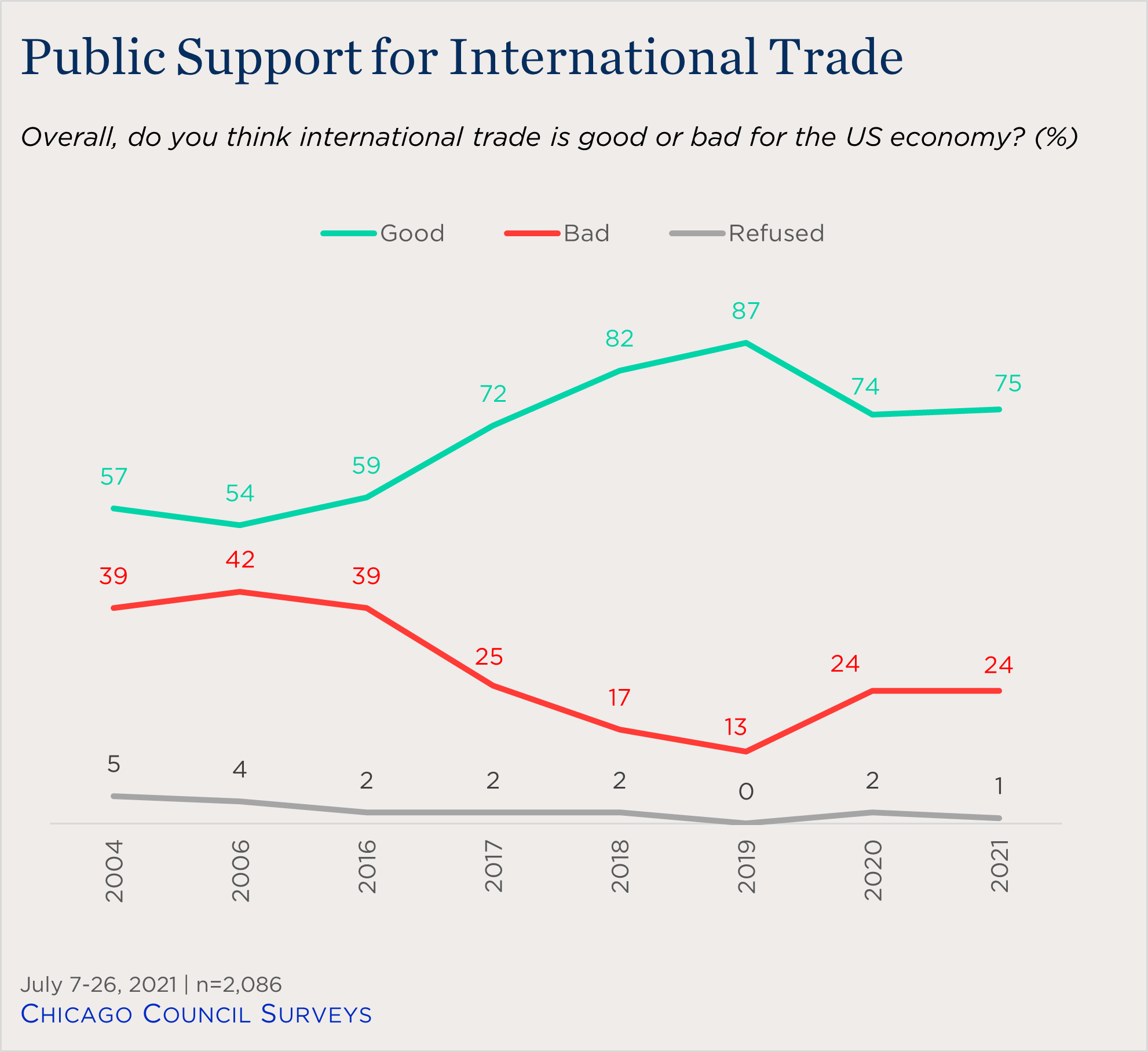
Rising public support for international trade has brought the public in closer alignment with the views of foreign policy opinion leaders. In the 2022 survey of 493 foreign policy opinion leaders conducted by the Council and the University of Texas, these opinion leaders—congressional staff, members of the executive branch, think tank professionals, leading academics, and interest group leaders—overwhelmingly viewed international trade as good for the US economy.
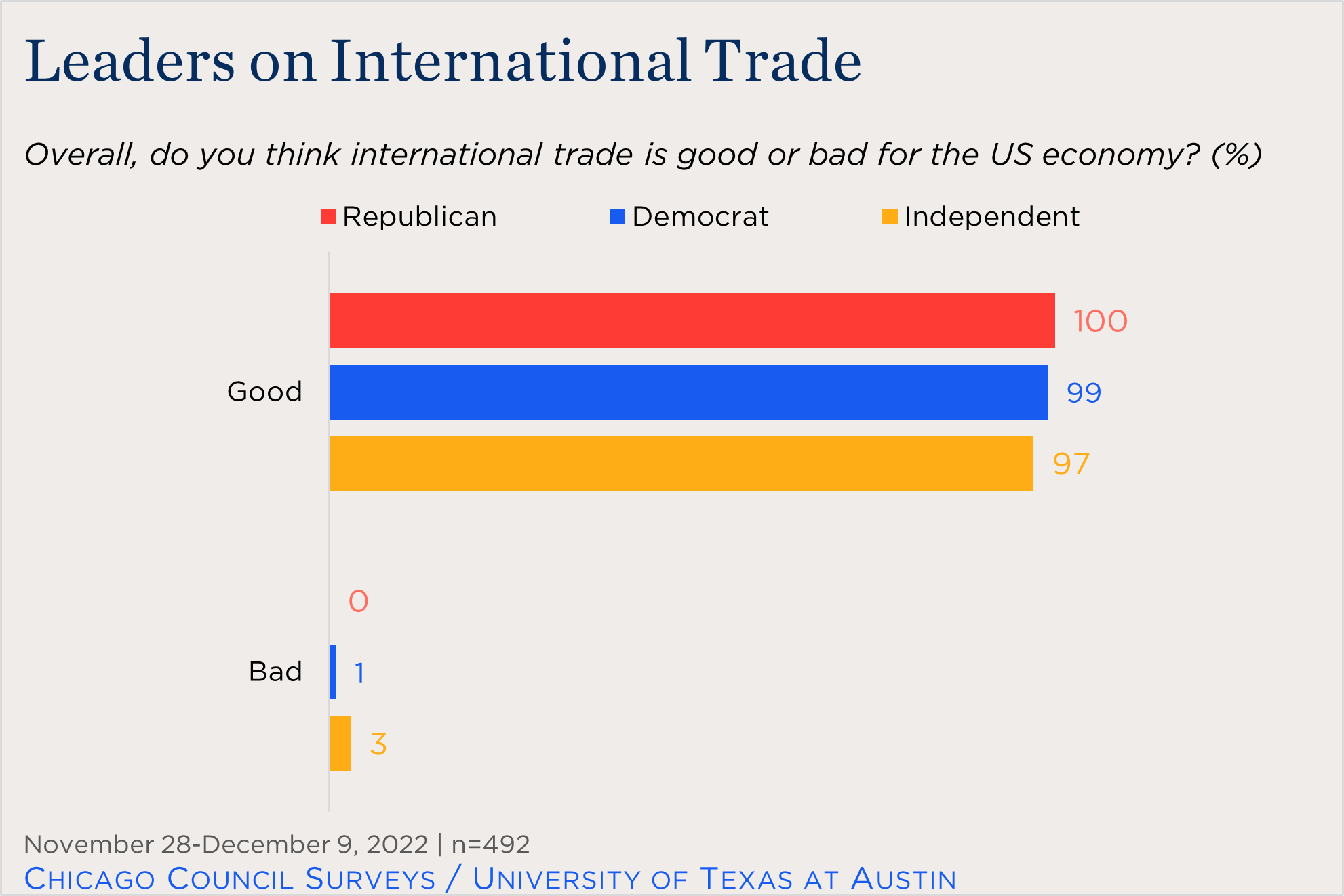
Broad Support for More Managed Trade Approaches
This apparent consensus masks a shift in how both leaders and the public think about international trade and the popularity of “friendshoring” and “allyshoring” approaches to trade. In the 2022 Chicago Council Survey, the public and opinion leaders were both asked what was a more important priority for the United States: 1. Keeping prices as low as possible, even if this means that supply chains run through countries that are unfriendly toward the United States, or 2. Ensuring that supply chains run through countries that are friendly toward the United States, even if this means higher prices for goods at home.
Among opinion leaders, large majorities of Republicans (93%), Democrats (84%), and Independents (80%) supported sourcing supply chains from friendly countries rather than seeking the lowest-priced goods. When the general public was asked this same question, they largely agreed: seven in 10 (69%) favored sourcing of supply chains from friends over cheap products, including similar majorities of Democrats (71%), Republicans (69%), and Independents (67%).
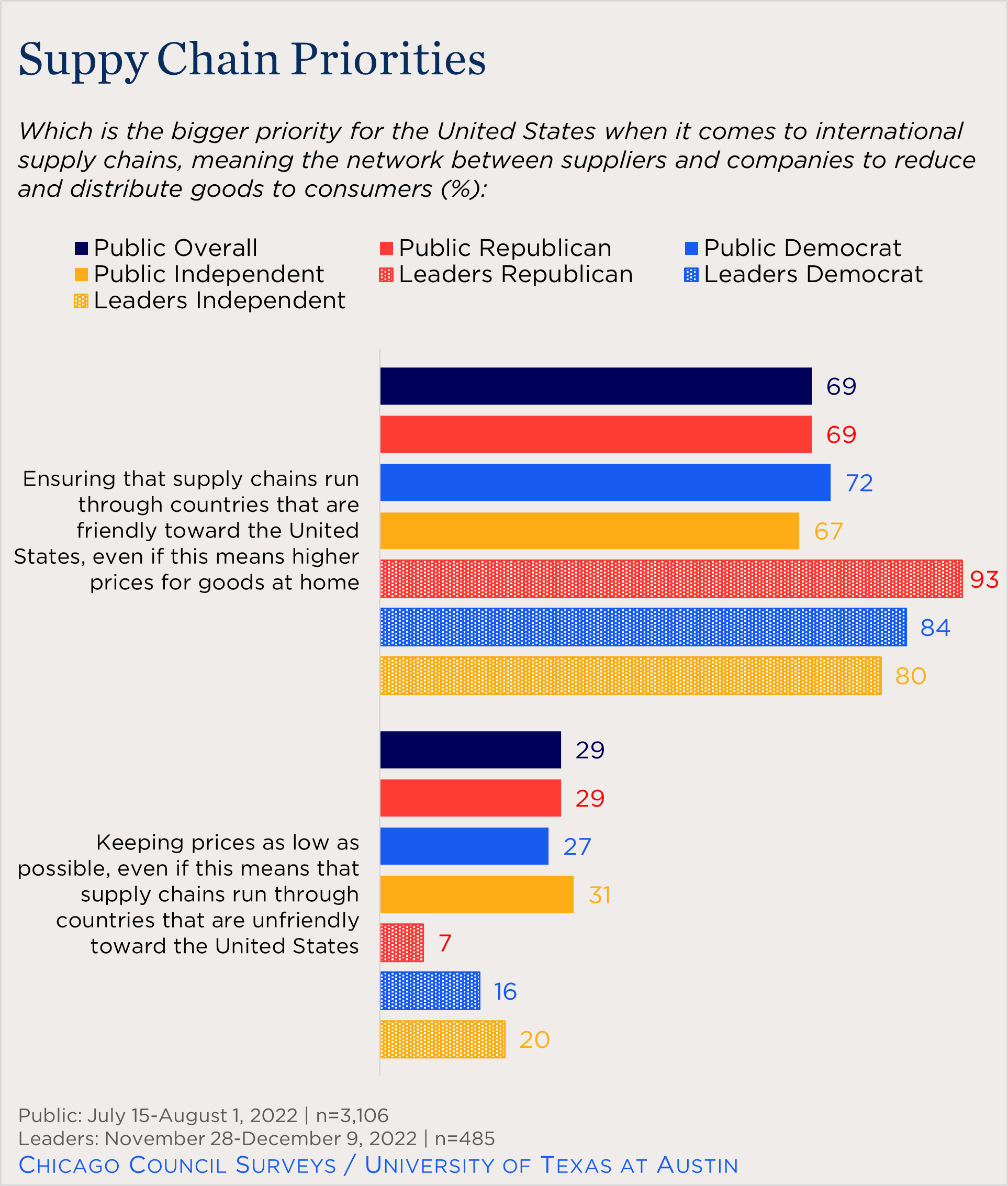
While this a hypothetical where the additional costs aren’t specified, these recent results nonetheless suggest broad elite and public alignment around the Biden administration’s emergent strategy of friendshoring production of key imports, such as critical minerals and batteries, from allies and friends of the United States. This strategy reflects a reorientation of trade policy in the wake of the COVID-19 pandemic, which underscored the vulnerability of global supply chains to disruption. Russia’s invasion of Ukraine also demonstrated the risks to other countries of being heavily reliant on hostile countries for key imported products.
As US-China relations have soured alongside growing geostrategic competition, policymakers have sought to reconcile their general orientation to international trade with a recognition that sourcing products from potentially hostile countries could prove disastrous. As these surveys demonstrate, trying to source more products and supply from friends and allies through “friendshoring” or “allyshoring” is popular both among leaders and the public.
Leaders Underestimate Public Support for “Allyshoring” Policies
However, opinion leaders do not have their pulse on what the public thinks about this issue. When opinion leaders were asked what they thought the public preferred, cheap products or sourcing from friendly countries, leaders tended to think the public was more focused on price. Democratic opinion leaders estimated 59 percent of the public favored cheap products, Republicans 56 percent, and Independents 62 percent. With only 29 percent of Americans preferring a lowest-price policy over a friendshoring policy, that’s a significant misreading of public attitudes.
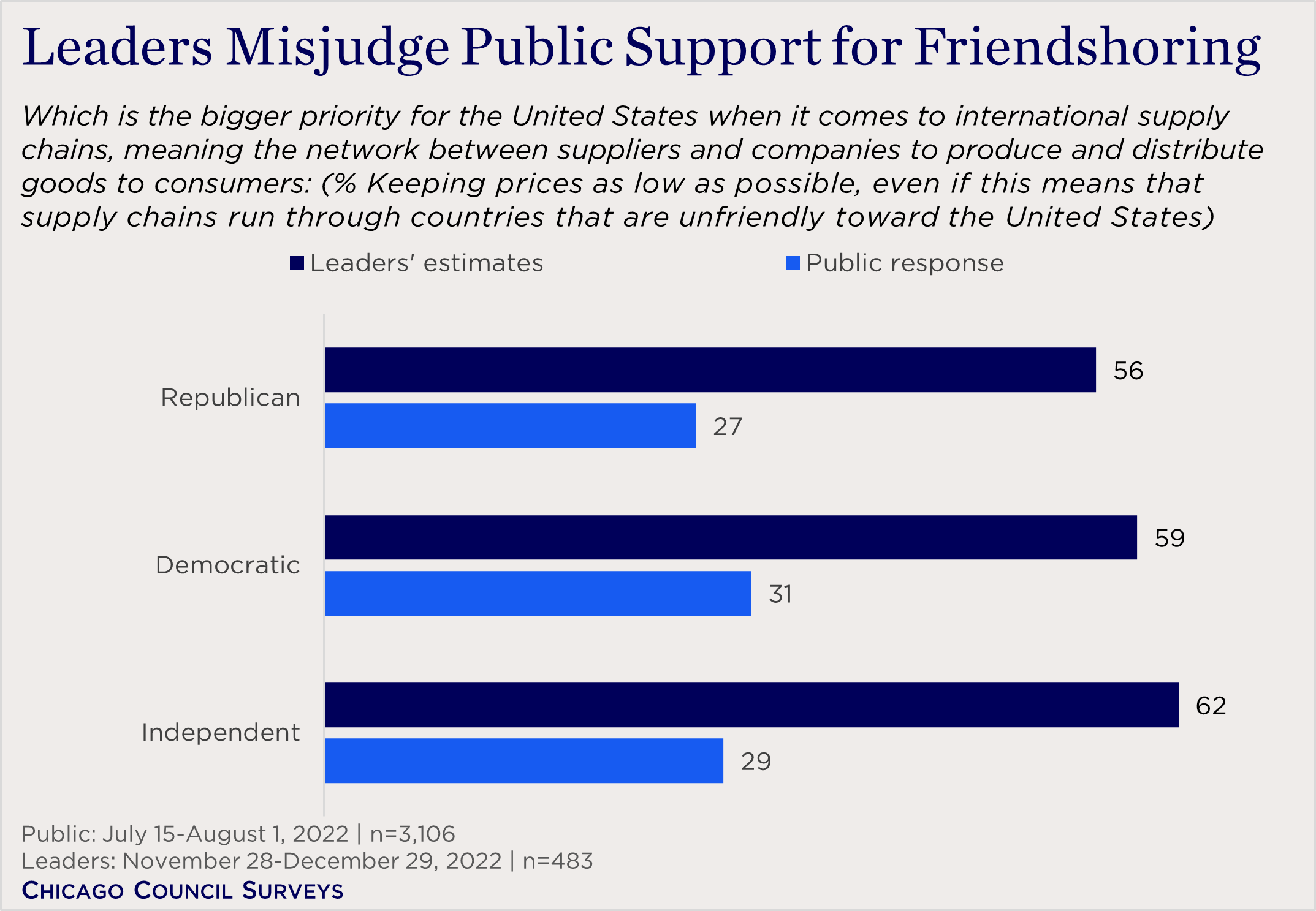
Nor is this the only instance of leaders getting the public wrong on trade. For example, in 2020, when 74 percent of Americans said trade was good for the American economy, foreign policy opinion leaders guessed the percentage was only 53 percent.
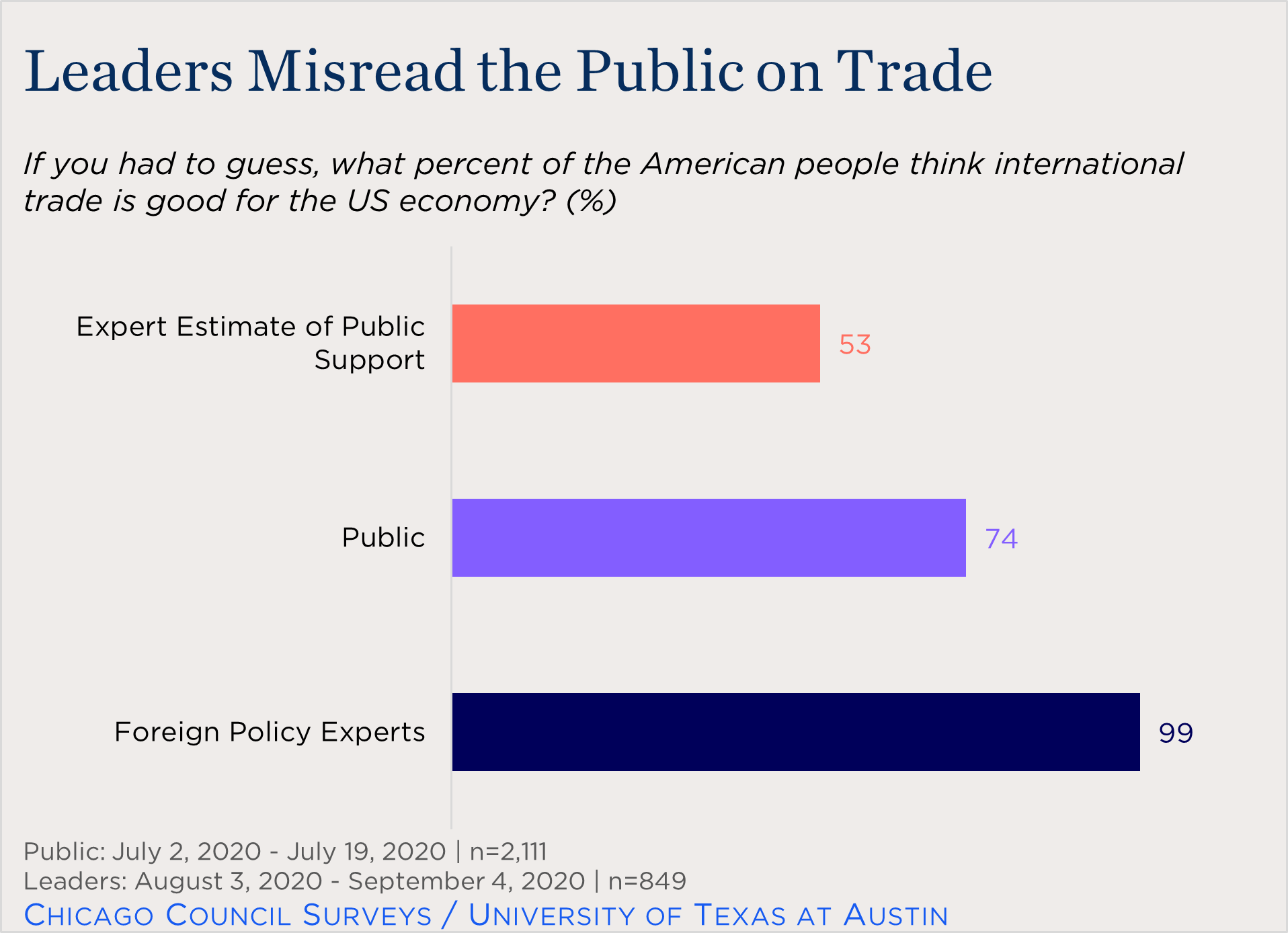
Conclusion: A Devil in the Details
As these surveys show, the Biden administration is on strong political ground to remake US trade policy. In that same speech, Sullivan described efforts to reinvigorate domestic production and source goods from friends as “foreign policy for the middle class.” That sounds appealing, and we’ll have to see how fast and how far the administration can go in translating that into action.
One potential problem: implementation of this strategy is tricky. As the Biden administration has tried to support friendshoring of electric vehicles, it has had to define (and expand) which countries’ manufacturers are eligible for the tax credits associated with the Inflation Reduction Act, needing both to placate close allies like Japan but also to boost the overall supply of minerals and materials from suppliers other than China.
Full economic decoupling from China is both unwise and infeasible in the short-run. China’s dominance in many of these sectors won’t dissipate overnight. It will take time to build up domestic manufacturing and production among America’s allies for critical minerals, solar panels, batteries, and other imported products.
In Congress, there may be more pressure to sever economic relations with China, as the two parties have largely rallied around a consensus hostility to China. That step would prove disastrous for the United States and the global economy. As the administration heads into an election year, the president will have to manage relations at home to prevent domestic dynamics driving relations with China beyond repair.


Related Content
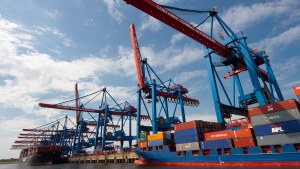 Public Opinion
Public Opinion
Americans across party lines say the United States should prioritize friendly-nation supply chains, despite potentially higher costs.
 Global Economy
Global Economy
Ally-shoring describes a program of sourcing essential materials, goods, and services with trusted friends while disengaging from China and other states that seek to undermine American interests from critical supply chains.
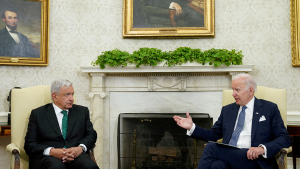 Global Economy
Global Economy
John Austin argues that a skilled and mobile workforce, as part of a U.S.-Mexico “ally-shoring” framework, can help address chronic vacancies in both countries.
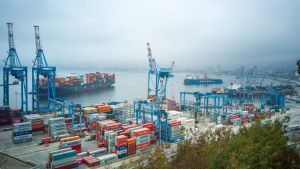 Global Cities
Global Cities
Economic, political, and security benefits can be achieved through ally-shoring labor and supply chains between the US and Mexico.